 Petzlover
Petzlover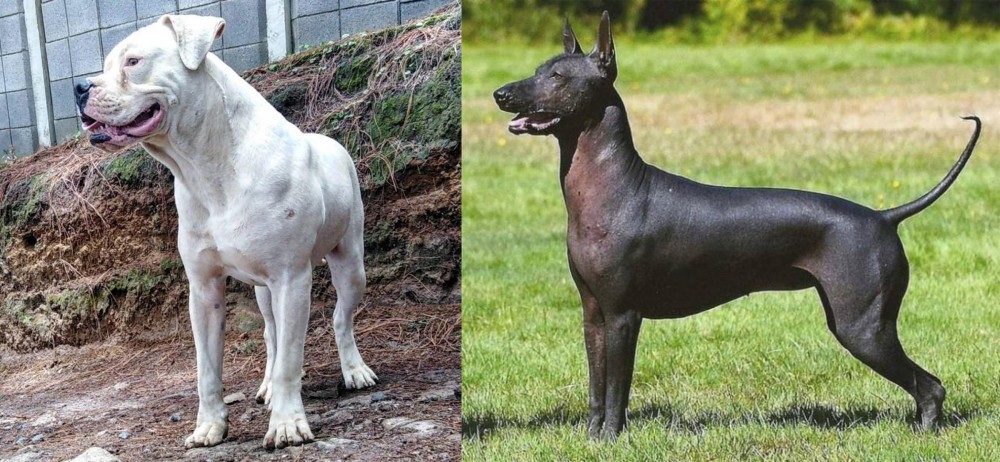 Dogo Guatemalteco is originated from Guatemala but Hairless Khala is originated from Mexico. Dogo Guatemalteco may grow 19 cm / 8 inches higher than Hairless Khala. Dogo Guatemalteco may weigh 31 kg / 69 pounds more than Hairless Khala. Both Dogo Guatemalteco and Hairless Khala has almost same life span. Both Dogo Guatemalteco and Hairless Khala has same litter size. Both Dogo Guatemalteco and Hairless Khala requires Moderate Maintenance.
Dogo Guatemalteco is originated from Guatemala but Hairless Khala is originated from Mexico. Dogo Guatemalteco may grow 19 cm / 8 inches higher than Hairless Khala. Dogo Guatemalteco may weigh 31 kg / 69 pounds more than Hairless Khala. Both Dogo Guatemalteco and Hairless Khala has almost same life span. Both Dogo Guatemalteco and Hairless Khala has same litter size. Both Dogo Guatemalteco and Hairless Khala requires Moderate Maintenance.
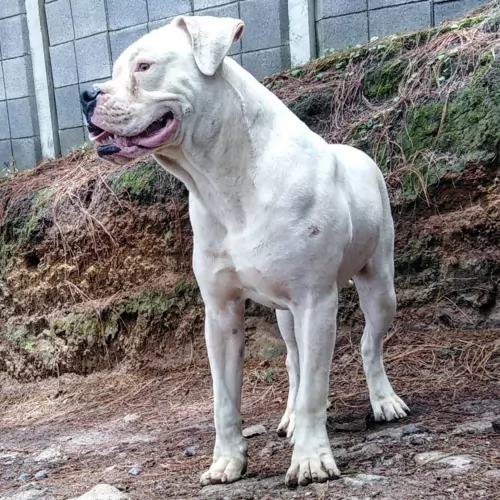 Known as the Guatemalteco Bull Terrier or Guatemalan Molosser, the Dogo Guatemalteco is also known as the Bull Terrier Guatemalteco, Guatemalan Bull Terrier, and Guatemalan Molosser.
Known as the Guatemalteco Bull Terrier or Guatemalan Molosser, the Dogo Guatemalteco is also known as the Bull Terrier Guatemalteco, Guatemalan Bull Terrier, and Guatemalan Molosser.
This big Molosser-type dog originates in Guatemala. In the 20th century, it was known as the Bullterrier Guatemalteco, but at the end of the century, it was changed to Dogo Guatemalteco.
Today, while the dog is kept as a companion dog, most are working guard dogs. The Dogo Guatemalteco isn’t recognized by any major international kennel clubs. However, the Kennel Club of Guatemala has given full recognition to this dog and it was in 1981 that the Guatemalan government named the dog as their national dog breed.
 The Hairless Khala is from a number of Latin American countries, and these countries have a variety of these hairless hounds.
The Hairless Khala is from a number of Latin American countries, and these countries have a variety of these hairless hounds.
The dogs are known by different names. Khala is the Bolivian Quechua Indian name and it means 'no clothing' - an absence of fur. Both Central and South America have their hairless dogs, descendants of ancestral dogs owned by the Incan Empire.
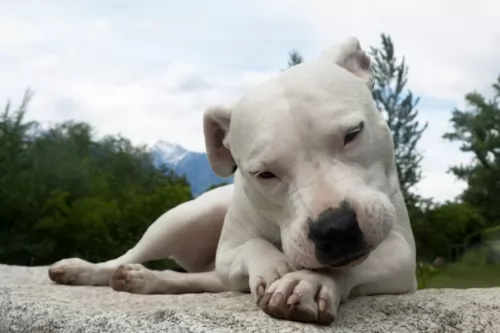 The Guatemalteco is a medium to large dog standing at 54 – 60cm and weighing between 40-45kg. He has a short, smooth coat and is essentially white with some black markings on the head.
The Guatemalteco is a medium to large dog standing at 54 – 60cm and weighing between 40-45kg. He has a short, smooth coat and is essentially white with some black markings on the head.
This breed was created from a crossing between a bull terrier, boxer and dalmatian. Some of the dogs are thickly built, while others are more leaner and athletic looking.
The ears of the dog vary quite a bit because while sometimes the ears fold down closely to the head, others are semi-pricked. There are some dog owners who have their dogs ears cropped into fully erect triangular shapes. The eye are small and usually dark brown.
The Dogo Guatemalteco is a fearless, evenly tempered dog. He was bred as a guard dog and he wants to protect his human family, forming a deep bond with them. It makes them difficult to re-home because of this.
It is imperative to have this dog trained and socialized because it might believe its the leader of the pack in your home. He is quite capable of getting along well with children and pets in the home. Because of his dominant nature, he isn’t suited as a pet for the first-time dog owner. He also doesn’t warm easily to strangers.
 There are 2 kinds of hairless Khalas – the Medio one which is a short legged dog which stands at roughly 36 – 41cm in height and weighs roughly 6 – 14kg. The other kind of khala is the Hairless Khala Grande, a long legged type.
There are 2 kinds of hairless Khalas – the Medio one which is a short legged dog which stands at roughly 36 – 41cm in height and weighs roughly 6 – 14kg. The other kind of khala is the Hairless Khala Grande, a long legged type.
Although the dog is hairless, you'll find some hair on the top of his head. For sake of space we'll refer to the Medio variety, a medium-sized hound with hairless skin which is dark grey in color.
The Hairless Khala is a friendly dog with his family but tends to be reserved with strangers. He gets on well with children in the home and because he isn't a particularly energetic dog, elderly people also find that he makes a super pet for them.
He is able to adapt easily to city- as well as country living. You need to be careful with him and not allow him out in the garden in the boiling sun as his skin can burn badly. Then again, without fur, he also tends to get cold easily.
He has dark brown eyes and the ears are fairly large in size and erect. He has a chest which is deep and broad and his tail is set fairly low and is held according to his mood.
He is an intelligent dog, and therefore easily trained. He is a loving, loyal dog who is capable of bonding closely with his human family.
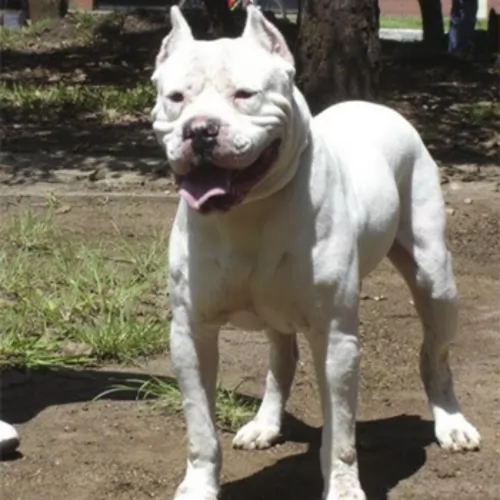 Your Dogo Guatemalteco is an intelligent dog breed, and because he is strong-willed and stubborn he might give you a hard time during training. It is possible though and it is important as the training will turn him into an obedient, relaxed dog, able to get on with all his family members, including pets.
Your Dogo Guatemalteco is an intelligent dog breed, and because he is strong-willed and stubborn he might give you a hard time during training. It is possible though and it is important as the training will turn him into an obedient, relaxed dog, able to get on with all his family members, including pets.
He is an energetic dog and will require walks and other forms of exercise each day.
This is certainly not the kind of dog that you buy to protect your property and provide little else for him except food and water. Frustration on the dog’s part can lead to destructive behavior and aggression.
 The Hairless Khala will make you an excellent pet, and children and the elderly are attracted to the dog because it is loving and docile. They are aloof with strangers, but training and socialization make him far more tolerant of strangers.
The Hairless Khala will make you an excellent pet, and children and the elderly are attracted to the dog because it is loving and docile. They are aloof with strangers, but training and socialization make him far more tolerant of strangers.
The Hairless Khala is an adaptable dog breed, and will adapt well to life in the city or in the country. Found throughout the Latin American nations, today he is essentially a companion dog, loving to be a devoted friend to his human family.
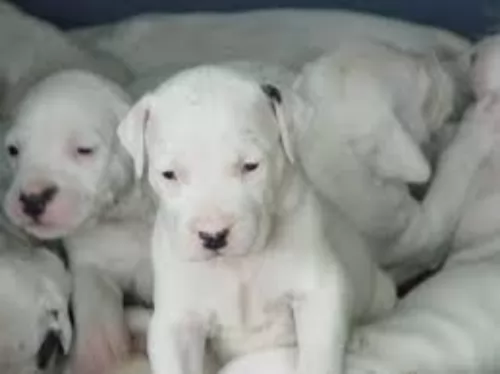 This dog can be susceptible to skin allergies. The skin is sensitive and prone to rashes.
This dog can be susceptible to skin allergies. The skin is sensitive and prone to rashes.
Another health concern with this dog because of his white coat, is congenital deafness. The deafness could be in one- or both ears.
The dog could also experience lameness, of which the most common problem is hip dysplasia. Because skeletal problems occur in this breed, it is advisable for owners to have their pet tested by the Orthopedic Foundation for Animals.
 The life expectancy of this dog is 10-14 years when he is treated well. The Hairless Khala is a robust dog breed but even so, there are diseases to look out for -
The life expectancy of this dog is 10-14 years when he is treated well. The Hairless Khala is a robust dog breed but even so, there are diseases to look out for -
Skin allergies are one of the reasons you may have to take your Hairless Khala to the vet. These sorts of skin allergies can be frustrating for a dog because the skin is irritated and itchy and he may have scaly areas or red bumps on his skin. If your dog is licking and scratching frantically, you will need to get him to the vet.
Periodontal disease is inflammation of the gums, and if food and bacteria accumulate on the gums, it forms plaque and transforms into calculus, leading to gingivitis. Check your pet's teeth regularly and also brush them with special canine toothbrush and toothpaste at least 2 or 3x a week.
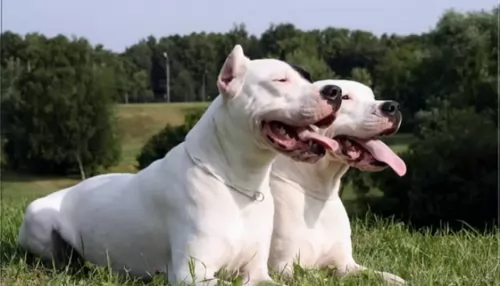 The coat of the dog is short and harsh and it sheds throughout the year. While he is still looked upon as a low maintenance dog, regular brushing will be required twice a week.
The coat of the dog is short and harsh and it sheds throughout the year. While he is still looked upon as a low maintenance dog, regular brushing will be required twice a week.
Because he is a dog breed that is susceptible to skin allergies, bathing isn't necessary as it removes the dog’s natural oils.
Other areas of grooming for this dog are brushing his teeth twice a week, trimming his nails and checking his ears.
Always choose a high quality dog food for your Dogo Guatemalteco and look at the feeding recommendations on the packaging.
When you feed your pet kibble, you can also mix in some cooked brown rice, vegetable and chicken for variety and contentment.
Raw meat is also advised from time to time. Don’t just go on and on through the years feeding your dog the same amount of food, as there are factors to take into account when deciding on food quantity. The age of your dog, it’s stage of life and its activity levels will mean regulating your pet’s food to match his needs.
 He isn't a super energetic dog but still, he will need to be taken for a walk every day.You can also include typical games that all dogs love – fetching a ball or pulling on a rope.
He isn't a super energetic dog but still, he will need to be taken for a walk every day.You can also include typical games that all dogs love – fetching a ball or pulling on a rope.
Because of the dog having little or no hair, they are considered fairly hypoallergenic and also low maintenance. You'd need to brush a dog with fur, but a hairless dog requires different grooming.
Speak to your vet about bathing your dog, the type of body wash to use and how frequently it should be done. Because your dog is hairless, he may require a sun cream in the Summer and a jersey in the Winter.
He will also need his nails clipped and his teeth brushed as part of his grooming process.
He may not have much hair, but when it comes to diet he is much the same as any other dog. If you feed him commercially manufactured food, always choose the best quality one in accordance with his age, height and activity levels.
Home-made food is always a welcome treat for your pet, but whatever you feed him, make sure it has the necessary minerals and vitamins to ensure his health. Essential fatty acids will be needed to keep the skin moist. With too much washing, the skin of these dogs will become irritated, dry and flaking if he doesn't received a nutritious, balanced diet. Make sure he has constant access to fresh, cool water.
When in any doubt as to how to look after a hairless dog, speak to your vet.